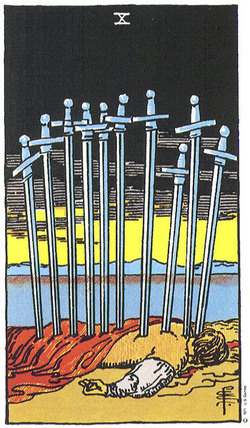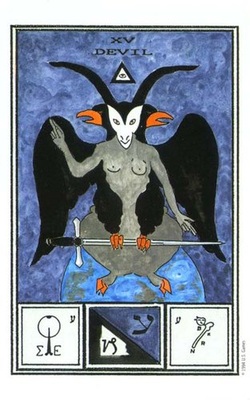 Have you ever encountered something that just makes your eye start twitching and your fingers start drumming? The kind of thing where no matter how much you try to practice non-judgmental bliss, it can sometimes just get to you? Here are a few things I've seen in Tarot that get under my skin.
1. "Gypsy" fortune teller acts. First of all, "Gypsy" is actually a really insensitive word. A lot of people don't know this, so don't feel horrible if you used it up to now or anything. But it's a big-time slur in Europe, and it isn't even accurate, considering it was used to refer to the Romani people because they "looked Egyptian" and no one could be bothered to ask them for the facts. Kind of like "Indians" referring to Native peoples in North America.
The actual semantics aside, if you're reading Tarot more for the entertainment than the counseling angle - and that is totally fine, seriously, as long as you make it clear that's what it is - then you can probably find a sparkly costume to do it in without an accent and the words "cross my palm with silver." Come on, guys. There are like six stereotypes that plays on, and not enough people know what they really refer to.
2. "Bad" cards. People who are reading for themselves tend to do this. A reversal is "bad". The high Swords cards or the Tower are "scary". The Star in the "what to watch out for" position means "you are heretofore advised to throw yourself into a pit of despair and never be optimistic again."
You can read everything super-literally if you want, and I get it if you want the cards to just serve up a slice of truth: "No, the job probably isn't on the way. And also you should probably look out for the bolt of lightning that's going to shake your world up. Just warning you." But I feel like I'm watching a mime box himself in. The problem isn't how you're reading, when you do it this way, it's how you're responding to what it says. I honestly can't, in my heart of hearts, believe your inner guidance and a hand from the Universe is simply saying "Your life will suck right now."
Why is there going to be a bolt from the blue, or a feeling of total despair? You're never helpless in your life, and rarely does anything just happen to you, so determine what's going to show up in your world and decide how you want to feel about that. Adjust circumstances accordingly. Maybe you're not supposed to get the job because there's a better one on the way. Or the sudden, painful revelation will lead to you reinventing your world in a way you'd never have been able to before. Tarot is never just about things happening to you. It's about looking at the road you're on, where it's leading, and if you want to change direction.
3. "They're doing it wrong!" Yes, before you ask, I see the irony here. But seriously, I can't stress this enough. Yes, there are close-minded ways of catering your reading to exactly what you want to hear, or responding to your reading from a place of fear. And that's not good for your learning, or what you get out of reading Tarot. But I'm talking about the methods you pick up and the teachers you choose. There is no end-all-and-be-all as far as that's concerned. The only way you could possibly be "doing it wrong" is if you learn one way, stop there, and refuse to learn anything else. The more information you gather, the more you can decide for yourself what's worth doing and how.
But, here's the real reason for this one: even if you work for years and decide the best way to learn or teach or read the cards or whatever else, please don't be a jerk about it. I have seen a few Tarot experts and instructors call each other out, often by name. I've seen them get judge-y for having a different opinion, teachinga certain way, charging a certain amount of money. I can't think of anything that turned me off faster than watching a seminar from an instructor, and listening to them smugly outline how their teaching was superior to someone else's book.
Everyone learns differently. Everyone responds to the cards differently. Don't limit yourself by stereotypes, by fear, or by inaction. But most of all, don't ever limit someone else by telling them there's only one way to tap into the cards. Tarot is far too elaborate, magical, and full of potential for that.
 When I was searching through Tarot articles for new information to share with you guys, I stumbled on something that really made me twitchy. In one article geared towards learning to read the cards for beginners, I saw an author saying it might be too confusing for a beginner to read multiple books on the cards, because it might lead to conflicting meanings.
And my first thought was: so what?
Here's the thing about Tarot meanings - they evolve, based on the reader, the deck, the author, the school of thought, the time of the writing. Saying that "conflicting ideas" will confuse you is like saying there's a right answer in the first place. But worst of all, it's like saying you can know too much.
I'm a bookworm and, showing my nerdy roots again, a Ravenclaw at heart. I can't think of anything you could possibly read too much on. You should always, always strive to learn as much as possible - or you'll get locked into one meaning, and unable to be flexible when the need serves. When you're reading for yourself or for someone else, you'll find a meaning for the cards that just doesn't fit the rest of the reading, unless you're willing to think outside the box a little bit or go with your gut. Saying that's "too confusing" is like assuming you can't think hard enough to read the cards in the first place.
There are things to watch out for, of course. Don't scatter your energies and try to tackle too many books at once without absorbing all of them. Don't take anything as gospel without examining why one author feels one way, and another might feel a different way. Don't fail to recognize real, historical facts, because Tarot's genuine evidence-based history shows a lot about where it came from and helps you appreciate how it evolved.
But there's never too much information. There are only ineffective ways of absorbing it.
 It's nearly a year ago to date. Attending a Lammas celebration, I go to a Tarot reader participating in the festival. She gives me a lot of wonderful advice about the new direction my life is moving towards, and the evolution I'm about to go through. She rightly tells me that in just six months, my entire outlook on life will be different.
She then speaks in extensive warnings about the man who will enter my life that I shouldn't trust with my heart, as he's just looking for a handout. She explains that I'll then meet a man I slowly grow closer to, and enter a more serious relationship with him.
I don't remember the exact details because at that point I had zoned out - when I wasn't exchanging glances with my long-time girlfriend of eight years, who was sitting on the chair right next to me.
As it happens, we did experience a period of growing much closer right around the timestamp this reader gave me. And some male friends were involved, but not in the way the reader said. It's not that this person was completely inaccurate in terms of my reading. She wasn't dead-on, but if you thought outside the box some of her advice was invaluable. But right away she'd made some assumptions about who I was and what I wanted out of life. And that was where she'd lost me.
It's not that this person was homophobic, or a bad person in any way. Really, any time we fail to be inclusive, we're a product of our environment. Ignoring the way our whole society focuses on one kind of person: how many decks that aren't made specifically for gay men feature a heterosexual Lovers card? How many genderqueer or trans people can you find in any Tarot deck? People over a certain weight? People who aren't white, which is thankfully becoming less of a problem, but I still see decks where there's not a single brown, black, or Asian face to be found.
Hell, you could even argue that the very construction of a Tarot deck - the quiet, intuitive High Priestess and the motherly Empress, the power-wielding Emperor and forceful Magician - is rooted in a certain set of gender roles. And Tarot came from the 15th century, so that's to be expected. But when do we challenge that, and what does it do to our preconceived ideas?
When you read for strangers, even if you're divining their lives, it's important to not assume the way those lives work. Even if we're not licensed therapists, a lot of us consider ourselves to be in service positions. That means we're meant to illuminate and empower the lives of our clients - and we can hardly do that when we don't realize a client is in a poly relationship, or asexual, or only feels female some of the time. It's not really our business to ask, but it's our job to know that these are possibilities - and that if we're operating in the web of life, sometimes there are strands we never even imagined we'd land on.

Here's one more look at something we're told not to do all the time that, if you go just a little deeper, may help you understand more about the world - and be more uniquely yourself in the process!
Listen to bad advice (but you don't have to take it!)
Here's a little nugget of wisdom I remembered from Anthropology 101: Everything has a purpose.
That doesn't mean it's a good purpose, or a purpose that's going to help everyone. A lot of the time, what helps one group take power leaves another group oppressed and left in the dust. Get-rich-quick schemes leave you with a burst financial bubble, and corrupt politicians break their promises and betray the people who put them in power.
But here's the thing: you know that phrase "follow the money"? Even if there's no money to follow, follow the "why". Someone is benefitting from all this, whether it's for quick money, more followers, or even just to feel good about themselves. And the people who take the bad advice? What are they getting? A sense of security? An outlet for their anger?
Sometimes there's an even bigger picture: what's happening in the lives of these people, the schemers and bullies of the world, that keeps them from stepping up and just putting good ideas in those places? Were they the victims of bad systems once before? Are there bad ideas in place that are keeping them mean or deceitful, because they think that's what the world has to really be like - instead of stepping up and changing their own behavior to something that works?
In the Tarot, the Devil card isn't actually about any real figure. You can believe in the Devil, or you can think he's a mythical figure, but the Devil card is about the things that bind us - often by our own choice. He's the addiction, the defeating self-talk, the bad habits, the mental chains we wear. He's what happens when we start listening to bad advice, instead of listening to our higher selves.
The Devil from the Ceremonial Magick Tarot, by Lon Duquette, is a great illustration of this. Even if you don't know much about ceremonial magick (and I'm still learning myself!), take look at the crows on either side of his face. They remind me a lot of double talk, and negative self-talk, and all the chatter in our lives from all angles. We may be smart enough to discount it, but we don't really think about what to do instead.
So use this exercise for yourself. You know the things you tell yourself late at night? The stuff that the musical 'title of show' so brilliantly calls the "vampires", the soul-sucking fear you're not good or creative or brave enough? Don't take that advice, but look at it for a second.
Where is it coming from? If you follow it, what will it help? Will it make you feel safer? More comfortable? Once you find out why you're telling yourself to just quit and go home, you can burst through the block with the good advice - the source of truth.
Don't take the bad advice. Don't even take it to heart. But if you look at all the bad advice out there, you'll get a lot closer to the good advice that will serve you well. Deep down, you know the difference.
|




 RSS Feed
RSS Feed

